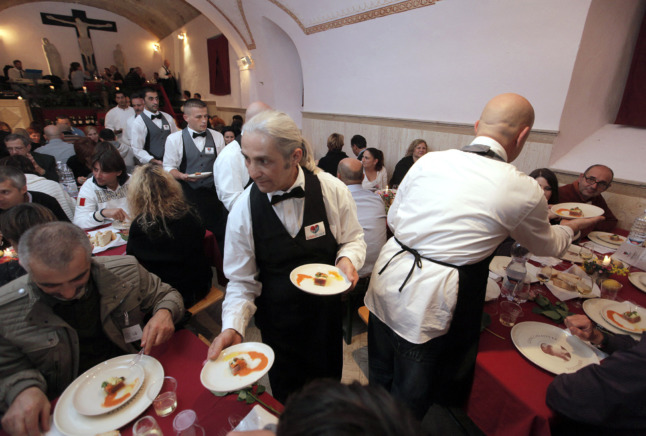La Bella Vita: Tipping rules, Italian habits and the most useful verb tenses

From the habits people pick up after moving to Italy to the Italian grammar you really need, weekly newsletter La Bella Vita offers you an essential starting point for eating, talking, drinking and living like an Italian.
La Bella Vita is our regular look at the real culture of Italy – from language to cuisine, manners to art. This new newsletter will be published weekly and you can receive it directly to your inbox, by going to newsletter preferences in 'My Account' or follow the instructions in the newsletter box below.
Italian grammar can be a lot to get to grips with, particularly the number of verb tenses: Italian has a total of 21 tenses, divided into two forms, plus a total of seven moods, also split into two categories.
This can be a bit much if you’re still perfecting your coffee order.
All of these tenses are still used in Italy (while in English, some of our 12 tenses are rarely used). But how many of these forms do you really need to know, at least at first? How many will you actually use in everyday life?
While your Italian language teacher will no doubt say “all of them” - piano piano, you'll get there eventually - some tenses are going to come in far more immediately useful than others.
So if you want to start speaking Italian right away, we’ve narrowed the list down to the five most useful tenses that you can’t get by without.
Which Italian verb tenses are the most useful?
Moving to any new country is guaranteed to bring changes to your lifestyle. But what are the most common new habits people pick up after moving to Italy?
As well as healthier eating, finding more time to relax, and getting more fresh air and exercise, readers admitted that after adapting to the Italian lifestyle they now find themselves “eating an entire pizza guilt-free” and “not taking traffic lights too literally”. Here’s what else you told us:
Eating well, driving badly, and daily naps: The habits you pick up in Italy
Speaking of stereotypically Italian habits, you’ve no doubt heard all about the reputation Italians have for being habitually late. But is this always true? How late are we talking? And what should you do when an Italian friend leaves you hanging?
We looked at why, when and how you’ll probably need to switch to ‘Italian time’ yourself if you want to keep your cool.
EXPLAINED: How late is it usual to be in Italy?

Tipping etiquette in Italy: what are the rules? Photo by FABIO MUZZI / AFP
And there’s a lot of confusion and contradictory advice out there about tipping in Italy, whether at a restaurant or in a taxi. Of course, you can tip whatever you like and it will always be appreciated - but what is actually expected? Ten percent? Twenty? Nothing at all?
We’ve got a quick overview of what you need to know about Italian tipping etiquette.
What are the rules on tipping in Italy?
Finally, if you’re not in Italy right now or can’t visit as often as you’d like to, reading books that transport you here might be the next best thing.
Here’s an article from the archives with some inspiration for lovers of literature, travel and history, featuring five of the best old Italian travel books - from classics that are still easily found to rarer volumes worth hunting down.
Travelling back in time: Five of the best old Italian travel books
Remember if you'd like to have this weekly newsletter sent straight to your inbox you can sign up for it via Newsletter preferences in "My Account".
Is there an aspect of the Italian way of life you'd like to see us write more about on The Local? Please email me at [email protected].
Comments
See Also
La Bella Vita is our regular look at the real culture of Italy – from language to cuisine, manners to art. This new newsletter will be published weekly and you can receive it directly to your inbox, by going to newsletter preferences in 'My Account' or follow the instructions in the newsletter box below.
Italian grammar can be a lot to get to grips with, particularly the number of verb tenses: Italian has a total of 21 tenses, divided into two forms, plus a total of seven moods, also split into two categories.
This can be a bit much if you’re still perfecting your coffee order.
All of these tenses are still used in Italy (while in English, some of our 12 tenses are rarely used). But how many of these forms do you really need to know, at least at first? How many will you actually use in everyday life?
While your Italian language teacher will no doubt say “all of them” - piano piano, you'll get there eventually - some tenses are going to come in far more immediately useful than others.
So if you want to start speaking Italian right away, we’ve narrowed the list down to the five most useful tenses that you can’t get by without.
Which Italian verb tenses are the most useful?
Moving to any new country is guaranteed to bring changes to your lifestyle. But what are the most common new habits people pick up after moving to Italy?
As well as healthier eating, finding more time to relax, and getting more fresh air and exercise, readers admitted that after adapting to the Italian lifestyle they now find themselves “eating an entire pizza guilt-free” and “not taking traffic lights too literally”. Here’s what else you told us:
Eating well, driving badly, and daily naps: The habits you pick up in Italy
Speaking of stereotypically Italian habits, you’ve no doubt heard all about the reputation Italians have for being habitually late. But is this always true? How late are we talking? And what should you do when an Italian friend leaves you hanging?
We looked at why, when and how you’ll probably need to switch to ‘Italian time’ yourself if you want to keep your cool.
EXPLAINED: How late is it usual to be in Italy?

And there’s a lot of confusion and contradictory advice out there about tipping in Italy, whether at a restaurant or in a taxi. Of course, you can tip whatever you like and it will always be appreciated - but what is actually expected? Ten percent? Twenty? Nothing at all?
We’ve got a quick overview of what you need to know about Italian tipping etiquette.
What are the rules on tipping in Italy?
Finally, if you’re not in Italy right now or can’t visit as often as you’d like to, reading books that transport you here might be the next best thing.
Here’s an article from the archives with some inspiration for lovers of literature, travel and history, featuring five of the best old Italian travel books - from classics that are still easily found to rarer volumes worth hunting down.
Travelling back in time: Five of the best old Italian travel books
Remember if you'd like to have this weekly newsletter sent straight to your inbox you can sign up for it via Newsletter preferences in "My Account".
Is there an aspect of the Italian way of life you'd like to see us write more about on The Local? Please email me at [email protected].
Join the conversation in our comments section below. Share your own views and experience and if you have a question or suggestion for our journalists then email us at [email protected].
Please keep comments civil, constructive and on topic – and make sure to read our terms of use before getting involved.
Please log in here to leave a comment.